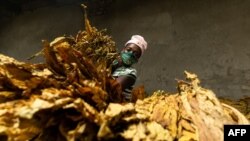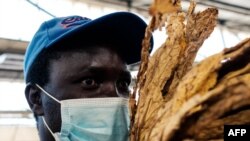Tobacco growers in Zimbabwe have continued to turn a deaf ear to global campaigns to shun tobacco and grow other crops that are less damaging to health.
Health experts warn of the health risks from growing tobacco. The Union for International Cancer Control says tobacco products kills more than eight million people worldwide per year.
Ahead of the annual No Tobacco Day, the WHO said it had teamed up with other United Nations agencies to support farmers wishing to convert from growing tobacco to growing food.
The scheme's pilot in Kenya has proved successful and now the U.N. wants to export it to other countries and continents.
"A record of 349 million people face acute food insecurity and that is up from 135 million in 2019," Ruediger Krech, the WHO's director for health promotion, said last week.
But the warnings do not deter Zimbabwe’s tobacco growers, who say the so-called "golden leaf" is fueling the economy and can not be substituted with any other crop.
Albert Chakala, a tobacco grower in Zimbabwe’s Mashonaland Central Province, said he would not switch to a food crop on his Forrester Estates.
"Tobacco farming is the way forward because in tobacco you can gain a lot in a small area (compared to) growing maize (which requires) more hectares to get more," Chakala told VOA.
Another grower Trymore Churu added tobacco farming was an important component to Zimbabwe's economy, as a top three foreign currency earner and "also its biggest employer."
The chairperson of the Tobacco Growers Association in Zimbabwe, Bright Bvukurumbwe, says some vices linked to production such as child-labor can be fixed, but farmers will continue to grow the crop that is sustaining families.
The WHO says one in four tobacco farmers – including women and children who help raise the crop – are poisoned by nicotine that seeps through the skin from handling the leaves of the plant. The global health organization says farmers may absorb the equivalent of 50 cigarettes per day.
Foster Gwanzura, who farms the crop in Beatrice, just outside Zimbabwe’s capital Harare, said tobacco remains one of the best options for making a living in the southern African nation and will not support any calls to shun the crop.
During the opening of the 2023 marketing season in March, the chairman of the Tobacco Industry Marketing Board, Patrick Devenish, said production was expected to rise 8.5 % to 230 million kilograms in 2023 up from 212 million kilograms in 2022.
Some information in this report came from Agence France-Presse.


Forum